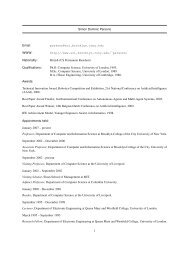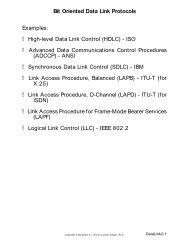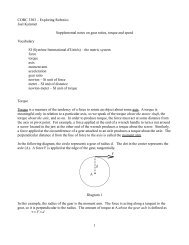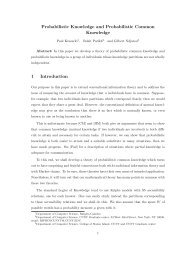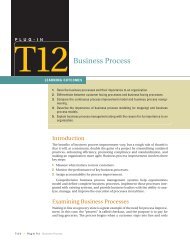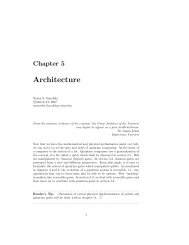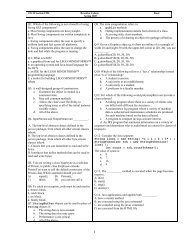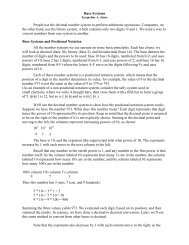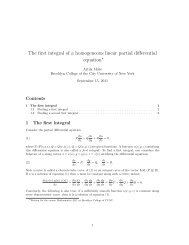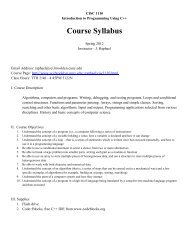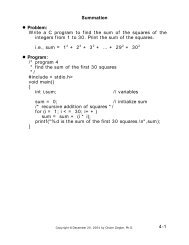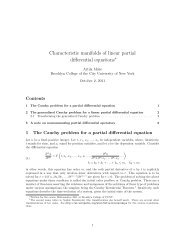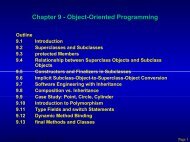*302 Greig and Others v Insole and Others 1977 G. No. 22461977 J ...
*302 Greig and Others v Insole and Others 1977 G. No. 22461977 J ...
*302 Greig and Others v Insole and Others 1977 G. No. 22461977 J ...
Create successful ePaper yourself
Turn your PDF publications into a flip-book with our unique Google optimized e-Paper software.
[1978] 1 W.L.R. 302 Page 33<br />
[1978] 1 W.L.R. 302 [1978] 3 All E.R. 449 (1978) 122 S.J. 162 [1978] 1 W.L.R. 302 [1978] 3 All E.R. 449 (1978)<br />
122 S.J. 162<br />
(Cite as: [1978] 1 W.L.R. 302)<br />
of breach of contract or any infringement of the<br />
legal rights of World Series Cricket. I am satisfied<br />
that they were acting in good faith <strong>and</strong>, on the<br />
available evidence, have no reason to suppose that<br />
the other delegates present at the ICC meeting of<br />
July 26 were not acting similarly.<br />
As has already been pointed out, however,<br />
good faith as such in the present context has no legal<br />
relevance. There were some 26 delegates of the<br />
various Test-playing countries present when the relevant<br />
ICC resolutions of July 26, <strong>1977</strong>, were<br />
passed, the majority of whom have not given evidence<br />
<strong>and</strong> many of whom are not reported as having<br />
said anything relevant for the present purposes at<br />
the meeting. In these circumstances any attempt<br />
subjectively to assess the innermost minds of all the<br />
representatives present would not only in my judgment<br />
be legally incorrect, but would be impossible<br />
to carry out. In my judgment, the intentions of the<br />
ICC as at July 26, <strong>1977</strong>, can only be judged by<br />
what it did that day <strong>and</strong> subsequently said to the<br />
outside world in its press statement of that day. As<br />
Lord Halsbury L.C. said in<br />
South Wales Miners' Federation v.<br />
Glamorgan Coal Co. Ltd.<br />
[1905] A.C. 239 , 244, it is a<br />
principle of the law that “people are presumed to<br />
intend the reasonable consequences of their acts.”<br />
The same principle must in my judgment apply a<br />
fortiori when judging the intentions of a large unincorporated<br />
association.<br />
Applying this objective test, how then are the intentions<br />
of the ICC as at July 26 in imposing <strong>and</strong> announcing<br />
to the world the Test Match ban, but deferring<br />
the date of its operation until October 1 to<br />
be assessed? In my judgment there can be only one<br />
answer to the question. This is that the ICC, by imposing<br />
<strong>and</strong> announcing the ban in this form, intended<br />
to apply pressure or persuasion to all players<br />
who had entered into contracts with World Series<br />
Cricket <strong>and</strong> were otherwise eligible for Test cricket<br />
to withdraw from their contracts by October 1. In<br />
my judgment it is no answer for the ICC to plead<br />
that in truth it only intended to apply pressure or<br />
persuasion to those players, if any, who might have<br />
lawful rights of withdrawal. <strong>No</strong>thing in the terms of<br />
its resolutions or of its press statement or of any<br />
other communication made by it to players gave<br />
any indication of such limitations on its intentions<br />
or drew any distinction between those players who<br />
might be fully legally committed to World Series<br />
Cricket <strong>and</strong> those who might have lawful rights of<br />
withdrawal. The pressure was, on the face of things,<br />
being applied by it as much to players who had<br />
fully binding contracts, as to those who had not;<br />
<strong>and</strong> this, I think, is how the ICC's intentions must<br />
be judged.<br />
On this basis, I find as a fact that the ICC, in<br />
passing its resolution of July 26 intended to apply<br />
pressure or persuasion to all players, who had contracts<br />
with World Series Cricket <strong>and</strong> were otherwise<br />
eligible for Test cricket, to withdraw from<br />
such contracts, whether or not they had lawful<br />
rights to withdraw. In the case of a number of persons<br />
present at the meeting, such intention was motivated<br />
by a belief that most of the players' contracts<br />
probably were not legally enforceable. The<br />
requisite intention to constitute the tort being<br />
present, however, the belief which motivated it, <strong>and</strong><br />
the good faith of the persons who held such belief,<br />
in my judgment have no legal relevance.<br />
I should, perhaps, add that I appear to be<br />
by no means alone in interpreting the ICC's intentions<br />
in this manner. A number of the persons who<br />
spoke at the ICC meeting of July 26 spoke in terms<br />
which showed that they contemplated that the proposed<br />
ban might have the general effect of causing<br />
a number of players to withdraw from their contracts<br />
with World Series Cricket, without drawing<br />
any distinction between those players who might<br />
have a right so to withdraw <strong>and</strong> those who might<br />
not. On August 22 the Board of Control for Cricket<br />
in Pakistan wrote to a Pakistan player, Mr. Iqbal,<br />
saying, inter alia:<br />
“The BCCP [the board of control] has also decided<br />
to abide by the decision taken alt the last ICC meet-<br />
© 2011 Thomson Reuters.



